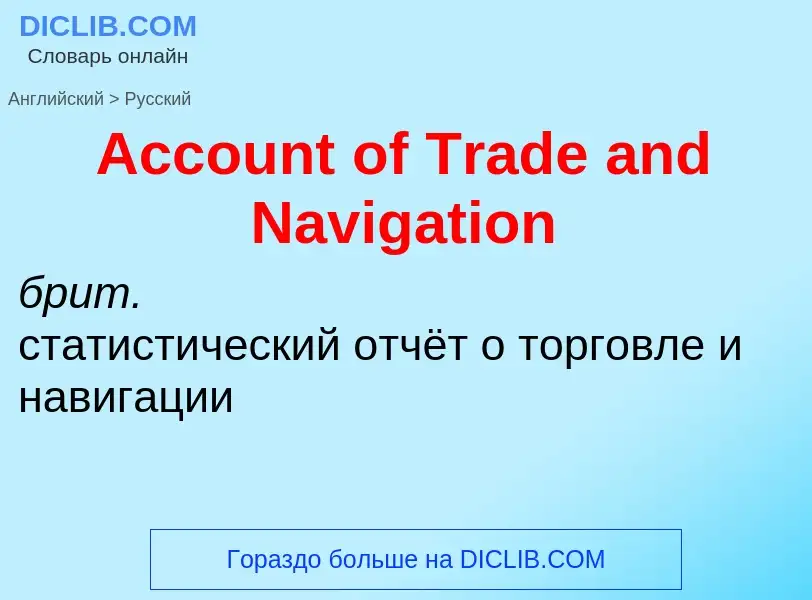Перевод и анализ слов искусственным интеллектом ChatGPT
На этой странице Вы можете получить подробный анализ слова или словосочетания, произведенный с помощью лучшей на сегодняшний день технологии искусственного интеллекта:
- как употребляется слово
- частота употребления
- используется оно чаще в устной или письменной речи
- варианты перевода слова
- примеры употребления (несколько фраз с переводом)
- этимология
Account of Trade and Navigation - перевод на русский
статистический отчёт о торговле и навигации
[dɪ,pɑ:tməntəv'ɪndəstrɪ]
общая лексика
Министерство промышленности (ведало вопросами национализированных отраслей промышленности; каких-либо функций контроля над частными предприятиями не имело; в 1983 слилось с Министерством торговли [Department of Trade], образовав Министерство торговли и промышленности [Department of Trade and Industry])
[dɪ,pɑ:tməntəv'treɪd]
общая лексика
Министерство торговли (в основном, занималось вопросами внешней торговли. Образовано в 1974; в 1983 слилось с Министерством промышленности [Department of Industry], снова образовав Министерство торговли и промышленности [Department of Trade and Industry])
синоним
существительное
банковское дело
счет предприятия (денежные средства в банке, сумма чистых активов)
экономика
счет движения капиталов [операций с капиталом, движения капитальных средств] (раздел платежного баланса, в котором отражаются операции, связанные с поступлением и предоставлением займов и осуществлением инвестиций)
бухгалтерский учет
счет капитала
(счет, на котором отражаются данные о размере акционерного капитала, обычно с разбивкой по видам (напр., обыкновенный акционерный капитал и привилегированный акционерный капитал))
строительное дело
финансовый отчёт
Определение
Википедия
The Navigation Acts, or more broadly the Acts of Trade and Navigation, were a long series of English laws that developed, promoted, and regulated English ships, shipping, trade, and commerce between other countries and with its own colonies. The laws also regulated England's fisheries and restricted foreigners' participation in its colonial trade. While based on earlier precedents, they were first enacted in 1651 under the Commonwealth.
The system was reenacted and broadened with the Restoration by the Act of 1660, and further developed and tightened by the Navigation Acts of 1663, 1673, and 1696. Upon this basis during the 18th century, the Acts were modified by subsequent amendments, changes, and the addition of enforcement mechanisms and staff. Additionally, a major change in the very purpose of the Acts in the 1760s – that of generating a colonial revenue, rather than only regulating the Empire's trade – would help lead to major rebellions, and significant changes in the implementation of the Acts themselves.
The Acts generally prohibited the use of foreign ships, required the employment of English and colonial mariners for 75% of the crews, including East India Company ships. The Acts prohibited colonies from exporting specific, enumerated, products to countries other than Britain and those countries' colonies, and mandated that imports be sourced only through Britain.
Overall, the Acts formed the basis for English (and later) British overseas trade for nearly 200 years, but with the development and gradual acceptance of free trade, the Acts were eventually repealed in 1849. The laws reflected the European economic theory of mercantilism which sought to keep all the benefits of trade inside their respective Empires, and to minimize the loss of gold and silver, or profits, to foreigners through purchases and trade. The system would develop with the colonies supplying raw materials for British industry, and in exchange for this guaranteed market, the colonies would purchase manufactured goods from or through Britain.
The major impetus for the first Navigation Act was the ruinous deterioration of English trade in the aftermath of the Eighty Years' War, and the associated lifting of the Spanish embargoes on trade between the Spanish Empire and the Dutch Republic. The end of the embargoes in 1647 unleashed the full power of the Amsterdam Entrepôt and other Dutch competitive advantages in European and world trade. Within a few years, English merchants had practically been overwhelmed in the Baltic and North sea trade, as well as trade with the Iberian Peninsula, the Mediterranean and the Levant. Even the trade with English colonies (partly still in the hands of the royalists, as the English Civil War was in its final stages and the Commonwealth of England had not yet imposed its authority throughout the English colonies) was "engrossed" by Dutch merchants. English direct trade was crowded out by a sudden influx of commodities from the Levant, Mediterranean and the Spanish and Portuguese empires, and the West Indies via the Dutch Entrepôt, carried in Dutch ships and for Dutch account.
The obvious solution seemed to be to seal off the English markets to these unwanted imports. A precedent was the Act the Greenland Company had obtained from Parliament in 1645 prohibiting the import of whale products into England, except in ships owned by that company. This principle was now generalized. In 1648 the Levant Company petitioned Parliament for the prohibition of imports of Turkish goods "...from Holland and other places but directly from the places of their growth." Baltic traders added their voices to this chorus. In 1650 the Standing Council for Trade and the Council of State of the Commonwealth prepared a general policy designed to impede the flow of Mediterranean and colonial commodities via Holland and Zeeland into England.
Following the 1696 act, the Acts of Trade and Navigation were generally obeyed, except for the Molasses Act 1733, which led to extensive smuggling because no effective means of enforcement was provided until the 1760s. Stricter enforcement under the Sugar Act 1764 became one source of resentment of Great Britain by merchants in the American colonies. This, in turn, helped push the American colonies to rebel in the late 18th century, even though the consensus view among modern economic historians and economists is that the "costs imposed on [American] colonists by the trade restrictions of the Navigation Acts were small."


![International Finance Centre]] in Hong Kong, where many capital account transactions are processed. International Finance Centre]] in Hong Kong, where many capital account transactions are processed.](https://commons.wikimedia.org/wiki/Special:FilePath/Two International Finance Centre.jpg?width=200)
